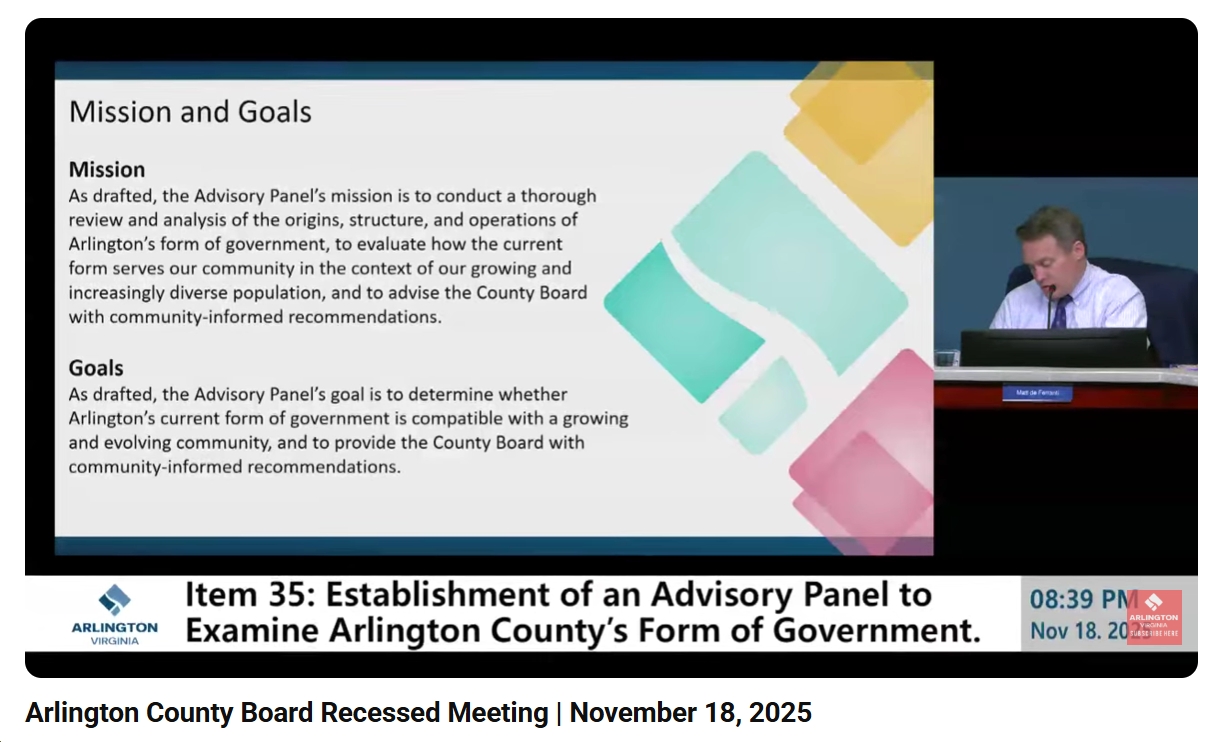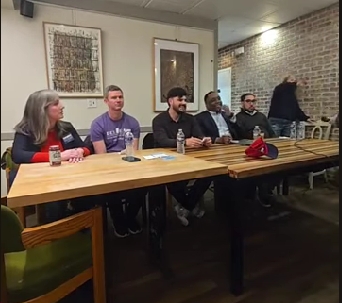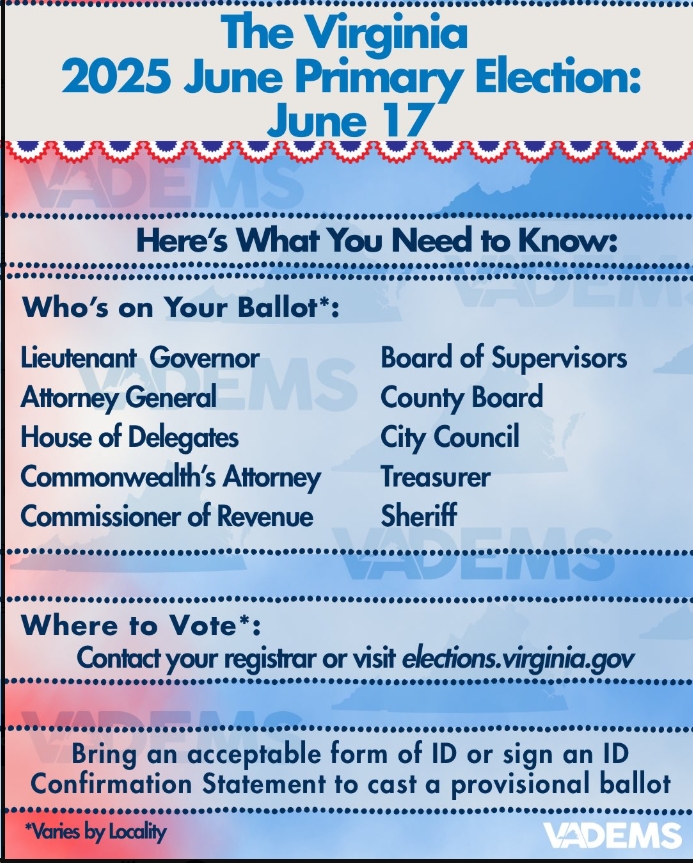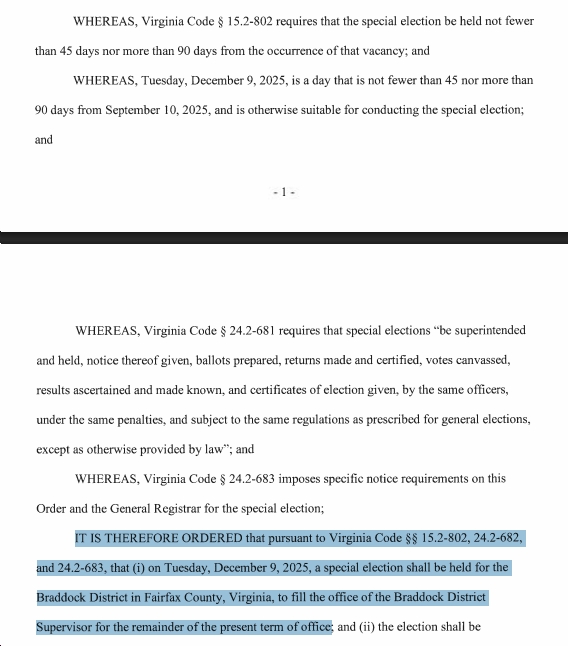Arlington is gearing up for a special election to replace Senator-elect Barbara Favola on the County Board, with the caucus dates now set for 2/2 and 2/4 (at the NRECA Building and Kenmore Middle School, respectively), and with numerous candidates announcing at this past Wednesday’s ACDC meeting (see videos of their speeches here). I recently sent out questionnaires to all the announced Democratic candidates, with a deadline of this morning. The first interview, with Elmer Lowe, is available here. The second interview, with Melissa Bondi, is available here, and the third interview, with Terron Sims, is available here. This interview, which was received about an hour past the agreed-upon deadline, is with Kim Klingler. The remaining two interviews will follow, hopefully soon, but obviously depending upon if/when they’re received. Thanks to Mr. Lowe, Ms. Bondi, Mr. Sims and Ms. Klingler for returning their Blue Virginia surveys (and to the first three for returning them ON TIME!), and to the remaining two candidates (Libby Garvey and Peter Fallon) in advance for their responses as well.
1. Why are you running for Arlington County Board and what makes you the most qualified candidate at this time?
I am running for the Arlington County Board because I believe that, with my broad-based community involvement and professional experience, I will bring a critical – and currently unrepresented – perspective to the County Board. I bring a business, community, and political perspective. We need a strong voice for health and human services, we need a leader for the preparation of the Metro Silver Line, and we need a champion for county board and school board collaboration. We need someone who is truly connected to the community, and understands the needs of all Arlingtonians, including those aging in place. I am that leader.
I am a leader who sees the big picture, who sees what matters most to us as individuals and to Arlington as a community, and I bring people together to achieve results. I will serve from a different perspective, bringing my experience as a first responder, Arlington Free Clinic volunteer, and senior manager at a major consulting firm. I am the most qualified candidate at this time because I have a broad base of community experience, a passion to serve the community I love, and I am committed to beginning discussions by listening.
You can learn more about my qualifications at my website.
2. What would you say are the top three challenges facing Arlington County right now?
I believe the top three challenges facing Arlington County are:
a. Smart Growth and Transportation.
Arlington has grown and changed so much in recent years. That growth brings other changes: many new high-rise buildings, more traffic, crowded schools, and the need for a renewed focus on people and public safety. As we grow in density along the corridors, we need to ensure that we are: preserving our neighborhoods, providing public services to ensure the safety of Arlingtonians, and are engaging communities and individuals early on in the discovery phases, as well as the decision-making processes. We also need to proactively prepare for the coming of the Metro Silver Line. Currently Tysons and Reston are gearing up for this transition and they have very aggressive plans in place to attract business and grow their commercial and residential density. In many ways, Arlington has provided Tysons and Reston with these great models. We now need to re-visit the models we have enacted and update and enhance them so that we can continue to be competitive in pricing for commercial investors and allow for the continued development of our vibrant communities.
b. County/Schools Collaborative Planning.
Great schools make great communities. It is no accident that our schools are nationally ranked and we must make sure that every student has access to a world-class education. As a county board member, I would work closely with the school board to focus on long-term planning, collaborative solutions, and to make sure we have multi-purpose facilities that can accommodate both county and school needs.
c. Maintaining a Diverse and Caring Community.
We are very fortunate to have a diverse community. We are also at risk of losing our diversity. We need to focus on maintaining affordable housing and balancing its availability along our corridors and within our neighborhoods. In addition, our community has services that are unique to many localities. In my experience as a volunteer first responder, I have seen that we can improve in connecting those in need to the appropriate services. Specifically, we need to work with long-term care and assisted living facilities, and those aging in place, in order to ensure Arlingtonians are aging with dignity.
3. What rules do you believe should apply to Arlington County Board members with regard to campaign contributions from donors with past, present, or upcoming business before the board?
Arlington County Board members should not solicit or accept campaign contributions from donors that have present or upcoming business with the county board, or those that have had significant past business with the county board. I am not going to accept campaign contributions from developers. I appreciate our developers and want to continue to work with them in a professional and ethical manner. Further, where there is a conflict of interest, board members should recuse themselves.
4. In general, do you believe that Arlington County Board members should conform to the Arlington County Code of Ethics, including items such as “Adhere to conflict-of-interest rules and avoid activities with real or perceived conflicts of interest?” Do you believe the Arlington County Code of Ethics should be revised? If so, what specific changes should be made to them?
Yes, Arlington County Board members should conform to the Arlington County Code of Ethics. If elected, I will urge my County Board colleagues to appoint a special task force to examine the current code of ethics and make recommendations for any appropriate changes.
5. How, in your view, should Arlington County best work within the constraints of the Dillon Rule and a state government dominated by Republicans in order to achieve the most environmentally friendly and most progressive community (e.g., in the areas of human rights and immigration) possible?
The Dillon Rule basically consolidates power at the state level and requires local government to gain approval from the General Assembly prior to enacting local laws or ordinances.
As hypocritical as it may be for Republicans legislators to preach about the importance of local governance, with the General Assembly firmly in Republican control, re-writing the Dillon Rule to give localities the ability to write and enact laws as they see fit is not likely to be a reality anytime soon.
While the Dillon Rule will not be going away anytime soon, that should not stop the County Board from promoting the progressive community standards and values that we are so dedicated to, and doing so in a way consistent with Virginia law. The Arlington County Board should look for every possible angle, in which to promote and enact ordinances that best represent our strong progressive values and traditions. This includes working with our locally elected state legislators to patron legislation on our behalf (i.e. domestic partner benefits, additional taxing authority, plastic bag tax), finding ways which are compliant with the Dillon Rule to enact ordinances that help Arlington maintain strict environmental protection standards, as well as looking for ways to incentivize developers to build in an environmentally sustainable way.
Additionally, I will work hard to educate the public about the limitations that the Dillon Rule imposes on our local government, and I will also work hard to find every opening in which local governments do have the power to legislate in areas such as human rights and immigration. In addition, I will speak out against the unfairness and antiquated nature of the Dillon Rule.
6. Do you support requiring, or at the minimum strongly incentivizing, all new commercial buildings constructed in Arlington County being constructed to the highest possible energy efficiency and “green” standards (e.g., LEED Gold or Platinum) possible? If you favor incentives, what specific incentives do you favor? If not, why not?
Yes, I support strongly incentivizing and potentially requiring all new commercial buildings to be constructed to the highest possible energy efficiency standards. Arlington (and Washington, D.C. metro area) developers are aware and already building to higher LEED standards. We have already encouraged LEED Silver in order to have increased density. We need to continue down this path and push for Gold and Platinum. But we need to go beyond LEED certification and need to have developers considering the recommendations put forth in the Community Energy Plan.
7. At the present time, do you see Arlington County as not friendly enough to small business, just about right, or overly permissive?
Arlington County is a great place to do business. As a consultant I am trained to guide clients in determining areas for improvement, how they can streamline processes, increase efficiencies, improve the user experience, and increase cost savings. This is an area where we have a lot of potential as a county. We need to set better expectations for small businesses regarding zoning, permit, and inspection requirements, consolidate these requirements, and present them in a more user-friendly manner. I also agree with the manager’s recommendation to transition some of the more detailed decisions-making regarding signage etc. from the county board to the county manager and staff.
8. Would you support putting strong incentives in place to encourage homeowners, businesses, and county facilities to install permeable pavement and other measures to prevent runoff of water?
Yes, I would support strong incentives to encourage homeowners, businesses and the county to install permeable pavement. Studies have shown that that permeable paving typically costs about 20 percent more, but can result in longer term cost savings. As we prioritize our capital maintenance needs, we need to consider permeable paving in the budget and planning process.
9. When the county orders the height of new residential buildings near Metro reduced in the name of aesthetics, what benefits do Arlingtonians see, and does that benefit offset the resulting reduced availability of housing?
We need to continue to reflect our values: ensuring public safety, conserving our neighborhoods, maintaining diversity, and promoting vibrant communities along the corridors. In order to do these things, we must find an appropriate balance. In order to maintain levels of affordable housing, we will need to agree to increases in density. However, as density increases, we must be prepared for the increased stress on our Metro, our roads, and public services. Although there may be aesthetic benefits to tapering buildings, and limiting the height of new residential buildings, we need to be more cognizant of the safety and quality of life of those living in the new buildings and the surrounding community.
10. What is your definition of “The Arlington Way,” do you believe our county’s been living up to it, and what can be done to strengthen it?
The Arlington Way is a commitment to diversity, to creativity and using public/private partnerships to solve problems, and to including all in the decision-making processes.
We do these things very well, but we can do better. We have the technology and the creativity to use other avenues to engage Arlingtonians earlier in the discovery and decision-making processes. One example of this is the year-round homeless shelter. A year-round homeless shelter is very much needed in Arlington, but the residents in the proposed area should have been engaged prior to finding out about the plan through the media.
11. Do you believe Arlington has the best possible process for determining which new capital projects to undertake and which to defer? If you believe this process could be improved, which specific improvements do you recommend and why?
No, I do not believe Arlington has the best possible process in making such determinations. The current process is not objective enough in its criteria and does not put the correct weight on capital maintenance and resolving our school capacity issues. As stated in the recommendations made by the Capital Improvement Planning Workgroup, which I was a member of, we may need to defer special projects in order to focus on the appropriate priorities and catch-up and keep-up with our capital maintenance needs. You can view the recommendations here.
12. What is your vision for the optimal Arlington County in the short term (5 years or less), medium term (10-15 years) and long term (20 years and out)? How would you go about achieving that vision?
Short term:
· As discussed in Question 10, we need to maintain and enhance the Arlington Way.
· Catching up and keeping up with our capital maintenance backlog.
· Developing Arlington’s Metro Silver Line plan and aligning it with the Crystal City Plan, the East Falls Church Plan and taking into account the Tysons and Reston Plans.
· Addressing our school capacity issues and putting a plan in place to have more multi-use county/school buildings and parks.
· Developing a task force or a plan that looks across Emergency Medical Services, Department of Human Services, and Department of Environmental Services in order to find ways to better identify those aging in place, provide them with the appropriate services, and consequently prevent the need for unnecessary emergency transports.
Medium Term:
· Continuing to be a model for smart growth and transportation, while addressing our capacity issues on the Orange/Silver Metro Line.
· Continuing to conserve our neighborhoods and our diversity.
· Implementing the Community Energy Plan and also looking at other regional approaches e.g. energy sharing, emergency communications, transit solutions.
Long Term:
· We want to be able to keep our identity while knowing that more and more people may be using Arlington as a place of transit, rather as a home or a place to do business.
· We must put the plans and processes in place now to handle the additional foot, bicycle and automotive traffic we may potentially see.
· The work that we do in Arlington will continue to be a model for the metro-D.C. area, as well as the nation. Therefore, all of our approaches need to focus on innovation, energy conservation, and maintaining our caring community.






![Monday News: “Tillis Savages ‘Misinformed’ Trump for ‘Betraying’ Voters”; “Trump’s [Budget] Bill Will Destroy America’s Climate Progress” – and MUCH More!; “What the University of Virginia Should Have Done”; Map of Walkinshaw’s Dominant Victory in VA11](https://bluevirginia.us/wp-content/uploads/2025/06/montage0630.jpg)











